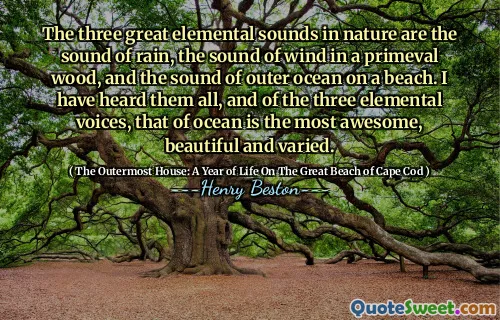Henry Beston was an American writer and naturalist best known for his work "The Outermost House," published in 1928. This influential book captures his year-long experience living in a small coastal cottage on Cape Cod, where he observed and reflected on the relationship between nature and humanity. Beston's prose is celebrated for its lyrical beauty and deep appreciation for the natural world, emphasizing the importance of living in harmony with the environment. In his writings, Beston advocates for a greater understanding of the natural world and urges readers to appreciate the quiet and wonder found in nature. His observations about the changing seasons, wildlife, and the sea resonate with many readers, encouraging a sense of mindfulness and connection to the Earth. Beston believes that spending time in nature is essential for human well-being. Beyond "The Outermost House," Beston's works include essays and other writings that further explore themes of nature and the human experience. His legacy continues to inspire environmentalists and nature enthusiasts who share his vision of reverence and responsibility toward the natural world.
Henry Beston was an influential American writer and naturalist, renowned for his poetic descriptions of nature. He wrote several books and essays, but his most famous work, "The Outermost House," significantly shaped nature writing in America.
Beston's experiences on Cape Cod emphasized the beauty and complexity of the natural environment, promoting a deep sense of respect and connection to it. His writings encourage readers to pay attention to the world around them and reflect on their place within it.
Through his prose, Beston continues to inspire those who seek a deeper relationship with nature, advocating for mindfulness and a greater appreciation for the moments spent in the outdoors. His legacy remains relevant, resonating with contemporary audiences who value environmental stewardship.
More »
Today Birthdays
1729 -
Edmund Burke
1949 -
Haruki Murakami
1954 -
Howard Stern
1876 -
Jack London
1993 -
Zayn Malik
1951 -
Kirstie Alley
1863 -
Swami Vivekananda
1923 -
Alice Miller
1987 -
Naya Rivera
1825 -
Brooke Foss Westcott
1944 -
Joe Frazier
1951 -
Rush Limbaugh
1964 -
Jeff Bezos
1978 -
Jeremy Camp
1628 -
Charles Perrault
1856 -
John Singer Sargent
1970 -
Kaja Foglio
1953 -
Rick Santelli
1986 -
Gemma Arterton
1968 -
Raf Simons
1958 -
Christiane Amanpour
1966 -
Olivier Martinez
1996 -
Ella Henderson
1917 -
Maharishi Mahesh Yogi
1949 -
Ottmar Hitzfeld
1928 -
Ruth Brown
1968 -
Heather Mills
1946 -
George Duke
1968 -
Rachael Harris
1923 -
Ira Hayes
